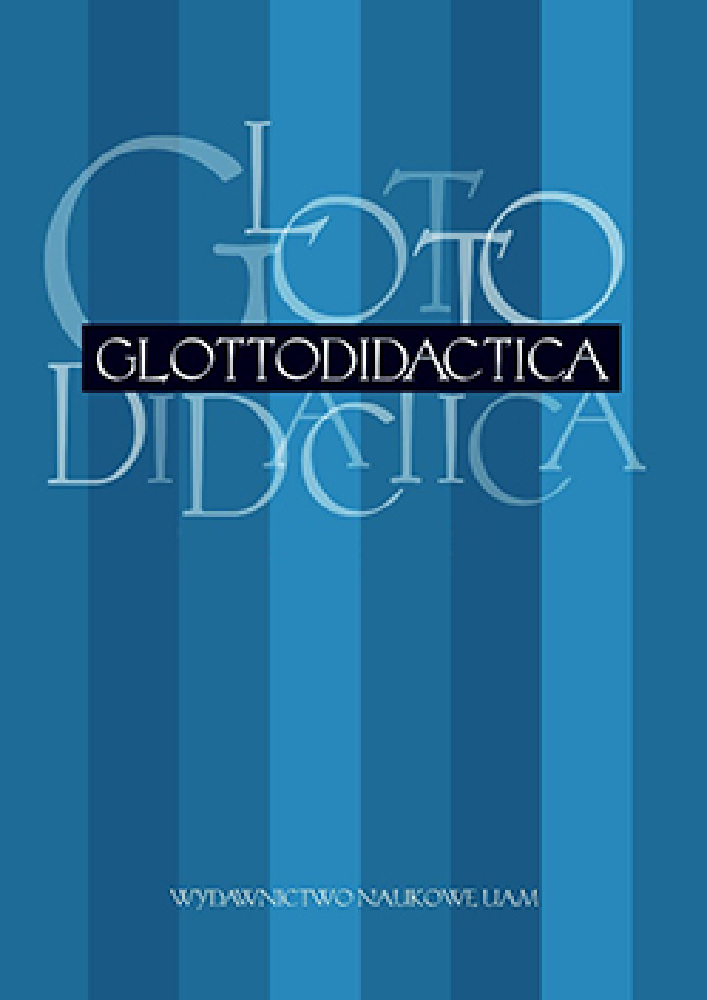Abstract
The main problem of the paper is if tools elaborated to observe and evaluate online discussion tasks can be also applied in face-to-face context and b-learning scenarios. I will discuss the main features of those tools (Henri 1992; Gunawardena et al. 1997; Garrison et al. 2001; Newman et al. 1995; Wozniak et Silveira 2004) and focus specifically on those features which allow the negotiation of the aims and the course of the argumentative, thus inviting critical argumentation.
References
Auriac-Peyronnet, E. 2004. Pensée réflexive et habilités argumentatives. In : Pallascio, R., Daniel M.-F., Lafortune, L. (eds.). Pensée et réflexivité. Québec (Sainte-Foy) : Presses de l’Université du Québec, 151–181. DOI: https://doi.org/10.2307/j.ctv18ph0t1.10
Boisvert, J. 1999. La formation de la pensée critique. Théorie et pratique. Canada: De Boeck Université (Ed. du Renouveau Pédagogique).
Coste, D., North, B., Sheil, J., Trim, J. 2001. Cadre européen commun de références pour l’apapprentissage et l’enseignement des langues – apprendre, enseigner, évaluer. Paris : Conseil de l’Europe/ Les Editions Didier.
Deschryver, N. 2009. Apprentissage collaboratif en formation hybride. In : Revue Education & Formation e-290 <http://ute3.umh.ac.be/revues/index.php?revue=6&page=3> (stan na dzień/ abgerufen am/date of access: 20.12.2015), 79–92.
Ellis, R.A., Goodyear, P., Prosser, M., O’Hara, A. 2006. How and what university students learn through online and face-to-face discussion: conceptions, intentions and approaches. In: Journal of Computer Assisted Learning 22, 244–256. DOI: https://doi.org/10.1111/j.1365-2729.2006.00173.x
Garrison, D.R. 1991. Critical thinking and adult education: a conceptual model for developing critical thinking in adult learners. In: International Journal of Lifelong Education 10/4, 287–303. DOI: https://doi.org/10.1080/0260137910100403
Garrison, D.R., Anderson, T., Archer, W. 2001. Critical Thinking, Cognitive Presence, and Computer Conferencing in Distance Education. In: The American Journal of Distance Education 15/1, 7–23. DOI: https://doi.org/10.1080/08923640109527071
Górecka, J., Nowicka, A. 2015. Uczenie się w interakcjach argumentacyjnych a tożsamość ucznia jako rozmówcy. In: Lingwistyka Stosowana 14/3, 41–55.
Gunawardena, C.N., Lowe, C.A. , Anderson, T. 1997. Analysis of a global online debate and the development of an interaction analysis model for examining social construction of knowledge in computer conferencing. In: Journal of Educational Computer Research 17/4, 297–431. <http://cde.athabascau.ca/coi_site/documents/Garrison_Anderson_Archer_ CogPres_Final.pdf> (stan na dzień/ abgerufen am/date of access: 20.12.2015). DOI: https://doi.org/10.2190/7MQV-X9UJ-C7Q3-NRAG
Hanna, B.E., de Nooy, J. 2009. Learning language and culture via public Internet discussion forums. Basingstoke. New York: Palgrave Macmillian. DOI: https://doi.org/10.1057/9780230235823
Henri, F. 1992. Computer Conferencing and Content Analysis. In: Kaye, A.R. (eds.). Collaborative Learning through Computer Conferencing: the Najaden Papers. Springer-Varlag: Berlin, 117–136. DOI: https://doi.org/10.1007/978-3-642-77684-7_8
Klus-Stańska, D. 2010. Dydaktyka wobec chaosu pojęć i zdarzeń. Warszawa: Wydawnictwo Akademickie Żak.
Mangenot, F., Penilla, F. (2009). Tâches, Internet et vie réelle. In : Le Français dans le monde, Recherches et applications 45, La perspective actionnelle et l'approche par les tâches en classe de langue. Paris : CLE International, 82–90.
Martin, D. 2005. Forum de discussion en formation des maitres. Apprentissage de la délibération collégiale. In : Deaudelin, C., Nault, T. (eds.). Collaborer pour apprendre et faire apprendre. La place des outils technologiques. Sainte-Foy, Québec : Presses de l’Université du Québec, 103–119. DOI: https://doi.org/10.2307/j.ctv18pgvgg.10
Newman, D.R., Webb, B., Cochrane, C.1995. A content analysis to measure critical thinking in face-to-face and computer supported group learning. In: Interpersonal Computing and Technology 3/2, 56–77.
Scardamalia, M., Bereiter, C. 2006. Knowledge building: Theory, pedagogy, and technology. In: Sawyer, K. (eds.). Cambridge Handbook of the Learning Sciences. New York: Cambridge University Press, 97–118. DOI: https://doi.org/10.1017/CBO9780511816833.008
Walkiers, M., de Praetere, T. 2004. L’apprentissage collaboratif en ligne, huit avantages qui en font un must. In: Distances et savoirs 2/1, 53–75. DOI: https://doi.org/10.3166/ds.2.53-75
Weasenforth, B., Biesenbach-Lucas, S., Meloni, Ch. 2002. Realizing constructivist objectives through collaborative technologies; threaded discussions. In: Language Learning & Technology 6/3, 58–86. DOI: https://doi.org/10.64152/10125/25177
Wozniak, H., Silveira, S. 2004. Online discussions: Promoting effective student to student interaction. In: Beyond the comfort zone: Proceedings of the 21st ASCILITE Conference Perth, 5-8 December 2004, Atkinson R., McBeath, C., Jonas-Swyer, D., Phillips, R. (eds). <http://www.ascilite.org/conferences/perth04/procs/pdf/wozniak.pdf> (stan na dzień/ abgerufen am/ date of access: 20.12.2015), 956–960.
License
Copyright (c) 2016 Joanna Górecka

This work is licensed under a Creative Commons Attribution-NoDerivatives 4.0 International License.
Authors
Authors of texts accepted for publication in Glottodidactica are required to complete, sign and return to the Editorial team’s office the Agreement for granting a royalty-free license to works with a commitment to grant a CC sub-license.
Under the agreement, the authors of the texts published in Glottodidactica grant Adam Mickiewicz University in Poznań a non-exclusive, royalty-free license and authorize the use of Attribution-NoDerivatives 4.0 International (CC BY-ND 4.0) Creative Commons sub-license.
The authors retain the right to the free disposal of the work.
Users
Interested Internet users are entitled to use works that have been published in Glottodidactica since 2016, under the following conditions:
▪ attribution – obligation to provide, together with the distributed work, information about the authorship, title, source (link to the original work, DOI) and the license itself.
▪ no derivatives – the work must be preserved in its original form. Without the author's consent, it is not possible to distribute the modified work in the form of translations, publications, etc.
Copyrights are reserved for all texts published before 2016.
Miscellaneous
Adam Mickiewicz University in Poznań retains the property right as a whole (layout, graphic form, title, cover design, logo etc.).
Privacy statement
The names and email addresses published on this journal site will be used exclusively for the purposes declared by this journal and cannot be used for any other purpose or by any other party.




